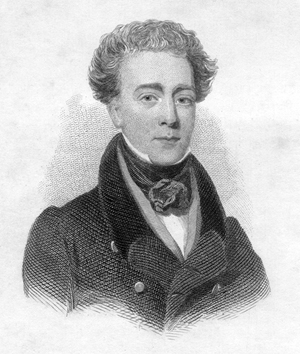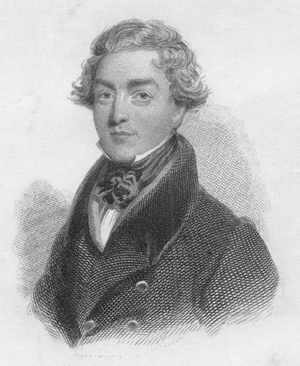John Lander, 1807-1839
Richard Lander, 1804-1834
Journal of an Expedition to Explore the Course and Termination of the Niger, with a Narrative of a Voyage Down That River to Its Termination. 3 vols. London: John Murray, 1832. [Rare Books Division]
Though we have adverted to the fact but seldom, nevertheless, throughout nearly the whole of our painful journey, we were both indisposed in a greater or less degree. In short, a very few days only had elapsed after our landing at Badágry, when we began to feel the debilitating effects of the African climate, and to experience a degree of languor which not even the warmest enthusiasm could wholly overcome. It is almost unnecessary to add that our spirits often sank under the depressing influence of this powerful adversary, whose inroads on our constitutions we had no means of resisting.
—Lander brothers, from their "Address to the Public" (Vol. 1)
The son of an English innkeeper, Richard Lander spent his teenage years as a personal assistant to travelers to the West Indies, the European continent, and the Cape Colony in southern Africa. In that capacity he accompanied Hugh Clapperton [see CLAPPERTON] on the captain’s second expedition to West Africa and was the only European survivor. In 1830, at the direction of the British secretary of war and colonial affairs, Lander undertook another mission, joined by his younger brother, John, to determine the actual terminus of the Niger River. The brothers first stopped at Cape Coast Castle, a seaport on the Gulf of Guinea in today’s Ghana, to recruit the Hausa guide Pascoe, whom Richard had employed on his last mission.
The plan was to proceed overland from Badagry (Nigeria) in a northeasterly direction—essentially following Clapperton’s route—reaching the Niger at Bussa, where Mungo Park had drowned twenty-four years before, and then descend the river in canoes to the Gulf of Guinea. They explored upriver from Bussa for about one hundred miles before commencing the float down on 2 August 1830. They were attacked and plundered at a place called Kirree and taken prisoners at Eboe by King Obie, who demanded ransom. Put in the custody of a native trader named King Boy, they reached the Brass River, a southward-flowing branch of the Niger, and followed the stream through the forest-clad delta to the Nun River, another branch, near the Bight of Biafra. There they encountered the British brig Thomas and secured their freedom. Via Rio de Janeiro, Brazil, the brothers arrived back in England in June 1831 and announced that the mystery of the Niger River finally had been solved. For his leadership of the successful mission, Richard Lander received the first cash prize of the Royal Geographical Society at the same meeting where its merger with the African Association [see AFRICAN ASSOCIATION] was announced. Returning to West Africa to investigate commercial opportunities for a Liverpool merchant group, Richard was killed by tribesman along the Niger River on 6 February 1834. John died several years later from a disease he had contracted in Africa.

